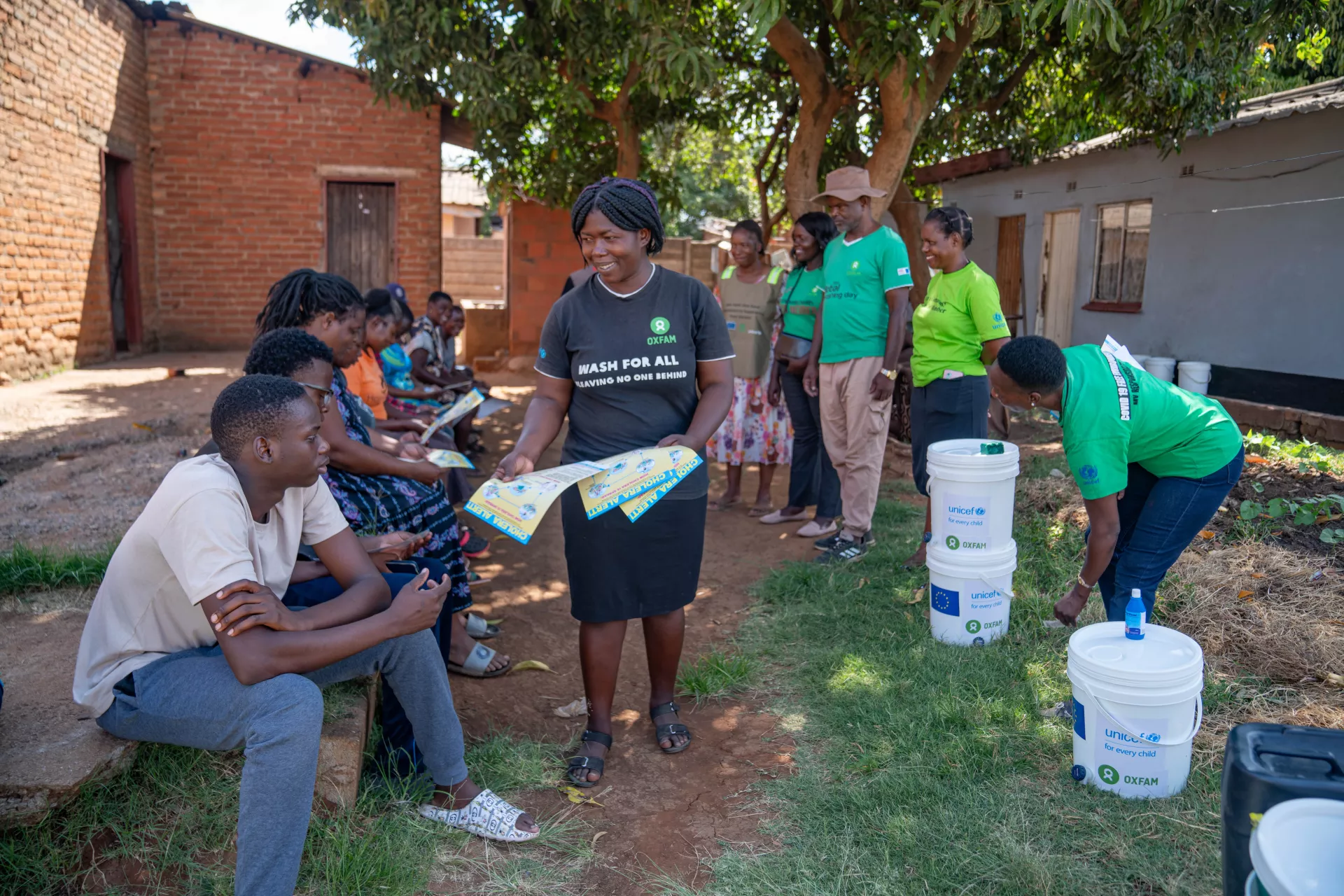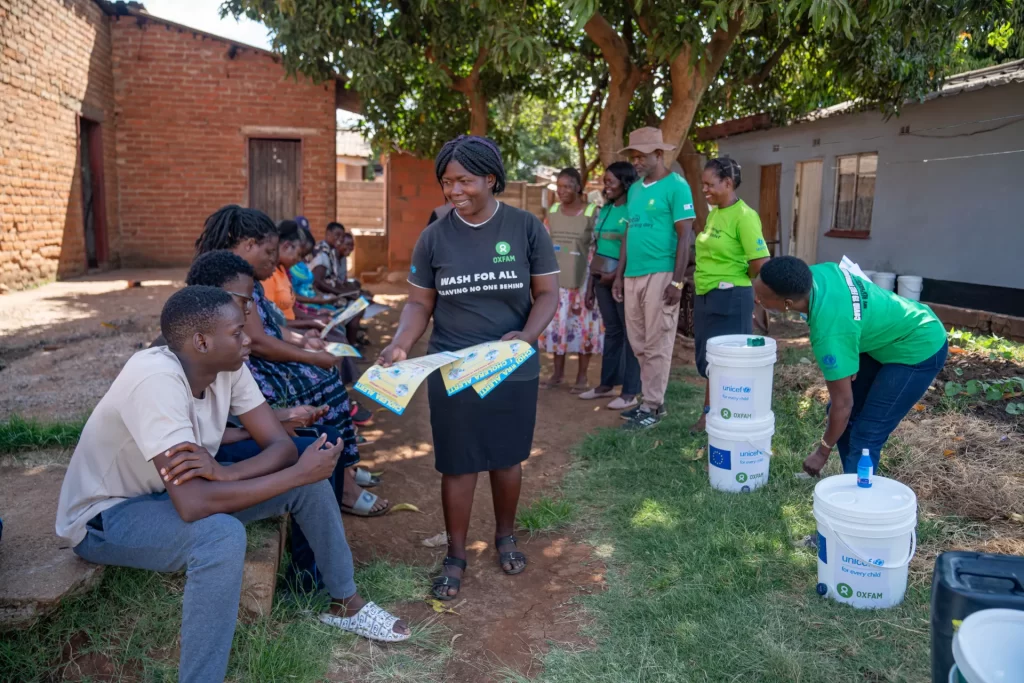
Community health promoters in Zim drive cholera behaviour change campaign
By Doctors For Human Rights on March 2, 2024 in Cholera, News
To avoid complacency and cholera outbreak recurrence, Community Health Promoters encourage safe water, sanitation and hygiene practices

Chitungwiza, Zimbabwe – Many people in Chitungwiza town’s St Mary’s suburb have received the cholera vaccine, in large part thanks to mobilisation efforts by community health promoters such as Ellen Nhambura.
But, even as infections show signs of receding, Nhambura and her team are still moving from house to house to keep people safe.
“We managed to get people to accept the vaccine despite pockets of resistance. Our mission is to teach them to continue practising healthy behaviour after getting vaccinated. The vaccination period is a critical moment because people may relapse into thinking that the vaccine is a replacement for safe and healthy behaviour,” said the 39-year-old who has been a community health promoter for three years.
The Ministry of Health and Child Care, in partnership with UNICEF and the World Health Organisation (WHO), launched a vaccination campaign against cholera on January 29.
The campaign targeted 2.3 million people.
According to the Ministry of Health and Child Care, 2,099,497 people had been inoculated as of February 20, 2024, which signals broad acceptance of the Oral Cholera Vaccine and the success of the campaign.
But vaccination is only part of the response by the government and its partners such as UNICEF.
At the vaccination campaign’s launch, Health and Child Care minister Dr Douglas Mombeshora and UNICEF country representative Dr Tajudeen Oyewale warned against post-vaccination complacency.
They emphasised that while vaccines work, they are not a replacement for safe water, sanitation and hygiene practices that are key to eradicating conditions that cause cholera.
Social and behaviour change campaigns driven by health promoters underpin the efforts to adequately prevent a recurrence of waterborne disease outbreaks.
This involves health promoters such as Nhambura fanning out across communities to raise awareness for people to change their attitudes towards water, sanitation and hygiene issues and share knowledge on effective practices to keep cholera at bay.
On a recent day, Nhambura joined about a dozen other health promoters to traverse the length and breadth of St Mary’s, one of the suburbs affected by the cholera outbreak.
One used a loud hailer to broadcast messages.
They carried and distributed leaflets on the streets and stopped at vegetable markets, shopping centres and bus termini to discuss water, sanitation and hygiene practices necessary to prevent the spread of cholera.
In one street, a group of women and men trooped out of their houses with their children to interact with Nhambura’s team.
Because the area lacks reliable running water, the health promoters emphasised the need for residents to fetch water from safe sources, keep it in clean containers and treat it with water purification tablets or by boiling it before drinking.
Residents listened attentively and asked questions as Nhambura used a flip chart with messages and illustrations on water treatment and storage, toilet and household hygiene, safe food handling, refuse management, oral rehydration and the importance of seeking treatment early.
“I know you are vaccinated, but for a permanent solution, please do these things we are teaching each other here,” said Nhambura, going through pages of the flip chart laden with colourful images of water, sanitation, and hygiene.
Paidamoyo Mhandu (27), one of the residents, said she ensured she and her three-year-old daughter were vaccinated when mobile vaccination teams moved around the area.
She said witnessing some fellow residents falling sick or dying from the disease, as well as the encouragement from health promoters, motivated her to get inoculated.
“But I was no longer treating our drinking water; I thought it was no longer necessary since we had been vaccinated. These health promoters opened my eyes,” she said, reading a flier on cholera prevention.
Community Health Promoters are a vital cog in the health delivery system because of their interpersonal links with communities, said Gertrude Zhakata, the Sister-in-Charge at the St Mary’s Cholera Treatment Centre, where two tents provided by UNICEF have ten beds each to cater for cholera patients.
“These campaigns would not be successful without the assistance of community health promoters. They are the people on the ground; they live within the communities they serve; so, people trust their word. They are a vital bridge between us and the people,” said Zhakata.
She said the health promoters undergo regular refresher courses to keep them updated on disease surveillance and control trends.

The dedication to saving lives beyond the vaccination campaign is palpable as Nhambura and her team move around the suburb wearing sun hats or carrying umbrellas to shield themselves from the searing heat.
She is part of a team of 25 community health promoters who collaborate with the Ministry of Health and Child Care and Oxfam, a partner of UNICEF in Chitungwiza.
They usually leave their homes around 8am to make rounds in the suburbs.
They often return home late in the afternoon after walking between 10 and 15 kilometres and reaching about 200 households daily.
“Yes, it seems like a tough job. But we are a dedicated group, and we know the importance of this work, especially for women and children, because they are the most vulnerable. We do our best to help them stay safe,” said Nhambura.
According to authorities, the door-to-door campaigns have reached over 300,000 people in Chitungwiza town alone.
In Chitungwiza, like other areas across the country, community health promoters are part of a wider more comprehensive social behaviour change campaign that includes radio programmes, road shows, water point committee training and the establishment and promotion of school health clubs.
UNICEF’s cholera response is funded by multiple donors, including the Centres for Disease Control and Prevention (CDC); the European Civil Protection and Humanitarian Aid Operations (ECHO); the Health Resilience Fund (HRF), a Zimbabwean pooled fund supported by the Governments of Ireland, the United Kingdom, the European Union, and GAVI, the Vaccine Alliance; Japan; the UN Central Emergency Response Fund (CERF) and UNICEF Global Humanitarian Funding, and with in-kind support from private sector partners such as Alliance Media & JCDecaux for digital billboards, and Cash-In-Kind logistics support for commodities from United Parcel Service (UPS) Foundation.

SOURCE:: UNICEF via link https://www.unicef.org/zimbabwe/stories/community-health-promoters-zimbabwe-drive-cholera-behaviour-change-campaign





